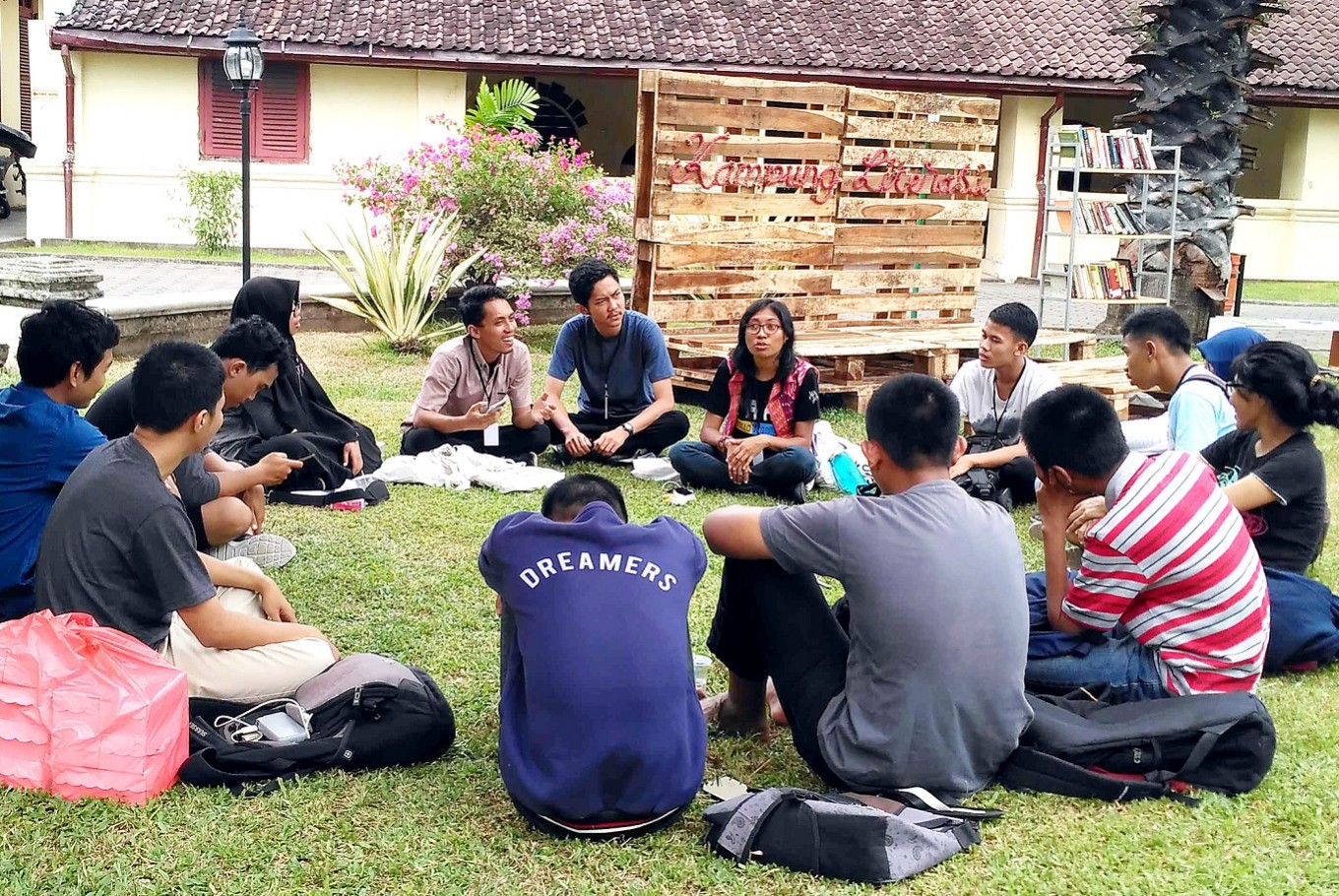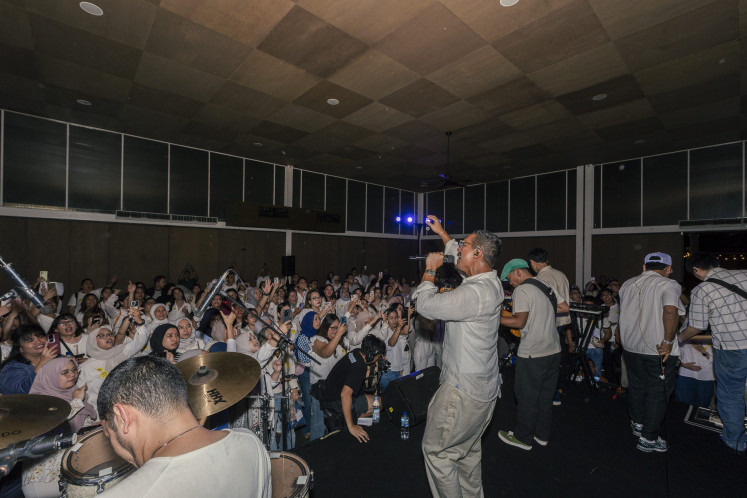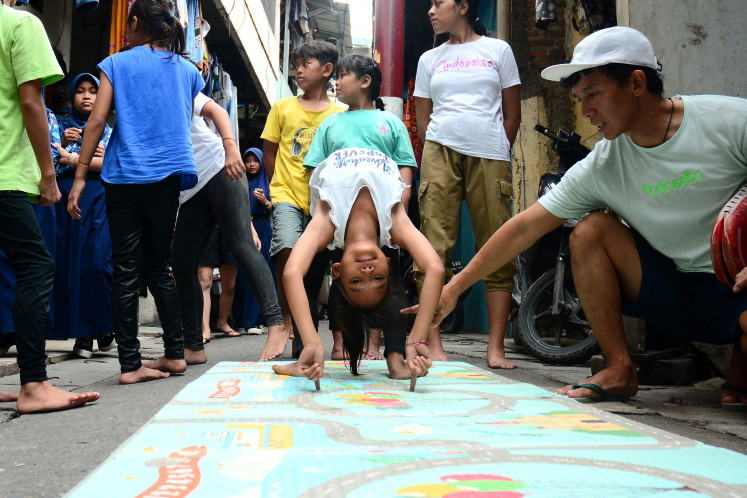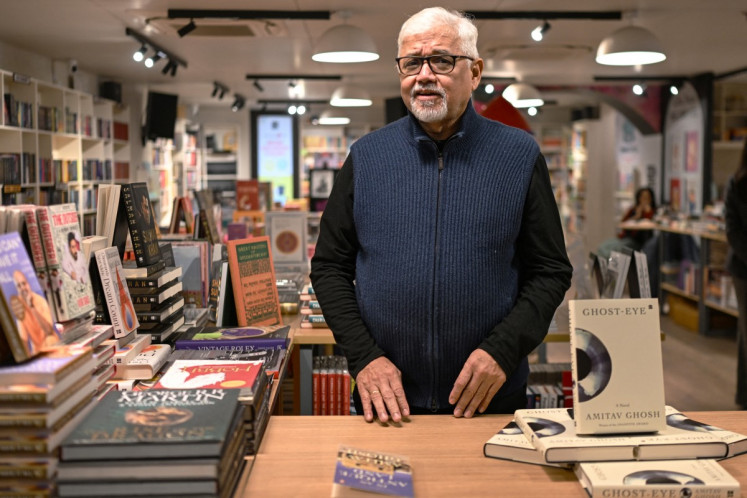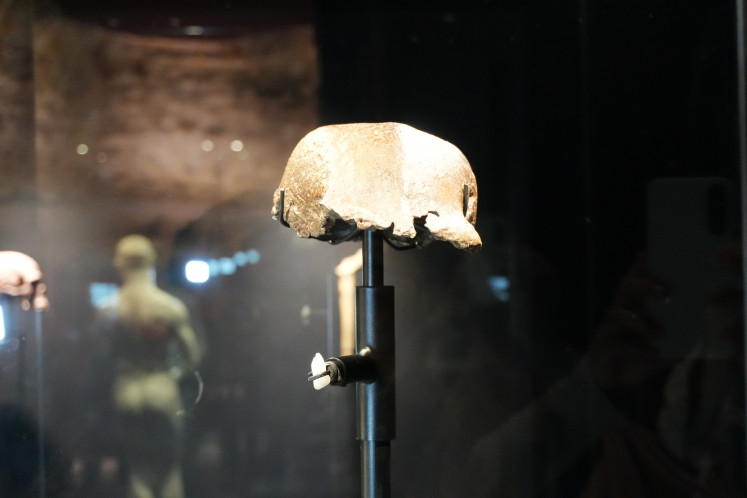Popular Reads
Top Results
Can't find what you're looking for?
View all search resultsPopular Reads
Top Results
Can't find what you're looking for?
View all search resultsThe literary light from the east
While the focus is on eastern Indonesian writers, the festivals invited writers from other parts of Indonesia and around the world of diverse races, ethnicities, religions and languages.
Change text size
Gift Premium Articles
to Anyone
“In one corner, a Balinese is weighing chili and rice on his scale A Bugis man is selling new and second-hand clothes In poorly lit alleys, laughter and seductive voices drown out one another Business looks good, life never asks for less, it is never wild enough.”
— Translated from “Di Pasar Simpong” (At Simpong Market), a poem by Jamil Massa
Six young writers sit cross-legged on the floor facing an audience of about 20 people in the air-conditioned room in Museum La Galigo. They listen as Budi Darma, a senior national literary figure, going through their works, pointing out where they fall short and praising where they do well.
The six could be on their way to stardom to follow in the footsteps of Jamil Massa, one of several writers whose careers were launched thanks to the inaugural Makassar International Writers Festival (MIWF) in 2011. Jamil was one of 11 writers from eastern Indonesia whose works were featured in a book called Dari Timur (From the East) launched at this year’s festival.
MIWF 2017, held from May 17 to 20, once again sought to promote writers from the eastern part of Indonesia to break the grip of western Indonesian writers on the nation’s publishing industry. “East” is Sulawesi and beyond, which includes West and East Nusa Tenggara, Maluku and Papua. “West” would include provinces on Sumatra, Java, Bali and in Kalimantan.
Six emerging writers have been invited to have their works scrutinized: Anaci Tnunay from Kupang (Nusa Tenggara Timur), Ashari Ramadana from Makassar, Bayu Pratama from Mataram (Nusa Tenggara Barat), Maria Pankratia from Ende (Nusa Tenggara Timur), Muhammad Arham from Luwu (Sulawesi Selatan) and Nurdahlia Simba Manna from Kolaka (Sulawesi Tenggara).
Budi Darma, a lecturer from the State University of Surabaya, told the aspiring young writers to use their imaginations, be more creative and write sharper.
Anaci said any tension she had before coming eased when Budi encouraged the young writers. “He taught us to write better,” Anaci said.
Maria, 30, said she had been writing short stories since primary school but never had had the chance to get them published. “Coming here is like a shot in the arm,” she said.
It was not only the chance to have their work reviewed by senior writers that drew young writers to the festival, but also the chance to meet with other prominent writers.
The historic Fort Rotterdam, a 17th century structure built during the Dutch colonial era, is now creating history in the Indonesian literary scene. Seven festivals proved that eastern Indonesian writers are just as good as their peers from the west and their true potential is just waiting to be discovered.
The Makassar festival has produced, among others, Cicilia Oday, whose short stories now grace national newspapers, novelist Erni Aladjai, who has published four books, Emil Amir, whose short stories have won national awards, and poets Faisal Oddang and Mario F. Kawi, whose collections of works have been published in several books.
The festival was the brainchild of the Rumata’ Artspace Foundation. One of its goals is to create a space for writers and instill interest among youth to enter into the contemporary literary world.
“The literary world is growing. Since we started this festival, many eyes are turning to Makassar,” Rumata’ founder Riri Riza said.
Poet and novelist Sapardi Djoko Damono, who hails from Java and has graced the festival for three years running, agrees the festival has brought out the hidden talents of the east.
“The writers from the east are just as good,” said Sapardi, whose hand-written manuscripts of works from 1958 to 1969 were displayed at the Rumata’ Artspace during the festival.
This year’s festival does not shy away from controversy by taking “Diversity” as its theme, taking a shot at the rising demand from some Indonesians to turn the nation into an Islamic state, a move that undermines the pluralistic characteristics that make Indonesia.
While the focus is on eastern Indonesian writers, the festivals invited writers from other parts of Indonesia and around the world of diverse races, ethnicities, religions and languages.
“History shows that diversity defines Indonesia, but we are now seeing tensions between people of different religions,” festival director Lily Yulianti Farid said, adding: “Literature can soften the heart, prevent cracks in our society and build mutual respect.”
Eastern Indonesia recently experienced some bloody ethnic and communal violence that has provided ample material for local writers. One session at the festival addressed how former children of the conflicts in Ambon and Makassar grew up and turned to art to create the space to help with the resolution.
Irfan Malik, who was only 10 when Muslims and Christians were killing each other in 1999 in Ambon, discussed the difficulties of getting people to talk about the conflicts, fearing that this would reopen old wounds.
Irfan was the scriptwriter of the acclaimed movie The Light from the East that portrays how Muslim and Christian boys trained together in a soccer team at the height of the Ambon conflict and went on to win national championships.
“We have to celebrate that we have come out of the conflict,” Irfan said.
Among the 75 writers taking part in the festival included Hong Kong based Xu Xi, Ypil Lawrence of the Philippines, Benedicte Gorrillot of France, Germany-based Shida Bazyar and Mark Heyward, Antje Missbach, Derek Pugh, Jemma Purdey and Madelaine Dickie, all from Australia. Three writers from Malaysia were Ridwan Saidi, Lokman Hakim and Shaz Johar. Indonesian writers included Bondan Winarno, Devi Asmarani, Maggie Tiojakin, Ika Natassa, Esti Kinasih, Salman Aristo, Debra Yatim and Maman Suherman.
Besides dialogues, book launches and writing workshops, one feature of the festival was called “To the Garden”, in which participants sit in the spacious park of the fort, browse and read books, and interact with some of the writers present.
In the evening, they screened movies in the open space, with recent titles like Athirah, Turah and Istirahatlah Kata-kata (Solo, Solitude).
The festival brought some of the events and writers to local university campuses, such as Makassar State University and the Alauddin Islamic University.
Smaller islands around Sulawesi were not forgotten. The festival was used to launch Colliq Pujie, a floating library meant to serve islanders around West Sulawesi province. The library was the initiative of Nirwan Ahmad Arsuka, Maman Suherman and Muhammad Ridwan Alimuddin.
For those who were able to visit the fort, it was literally a rare literary treat.
“I learned a lot, I got to meet with writers and now I have a new spirit to start writing,” said 26-year-old Farida Inayah, who came to the festival straight from work.
Febrianty, 24, an engineering graduate who had just finished a work contract in Papua, is taking up writing and went to all the workshops on offer.
Writing, rather than engineering, is her real passion, she confessed. “I got a lot of inspiration from writers here,” Febrianty said.
She and many others like her who went to the festival could be the next emerging writers from the east.

